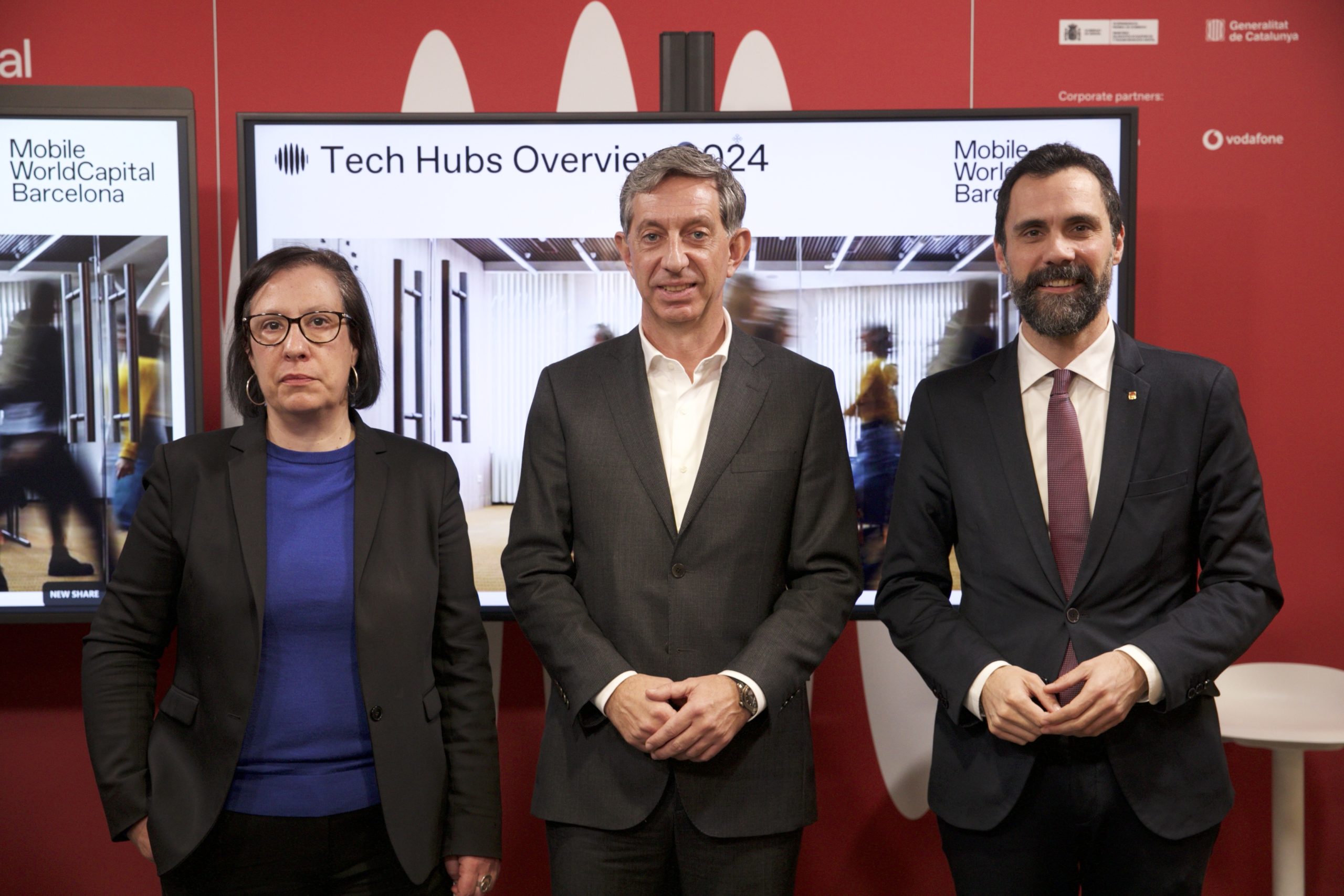- The technology centres located in Catalonia generate 26,407 jobs and an economic impact of 2,500 million euros per year, according to the Tech Hubs Overview report promoted by Mobile World Capital Barcelona.
- The number of hubs has quadrupled in the last seven years and the forecast is to exceed 36,000 jobs and 3,600 million by 2026.
- Generative Artificial Intelligence is the highest growing technology, while Health is the area where investment has increased the most.

February 14, 2024
Catalonia is currently home to 140 international technology hubs, 14 more than a year ago and four times more than seven years ago, when the commitment to attract this type of centre began, according to the second Tech Hubs Overview report, promoted by Mobile World Capital Barcelona, with the collaboration of ACCIÓ -the agency for the competitiveness of companies of the Generalitat de Catalunya-, and the Directorate of International Economic Promotion of the Barcelona City Council, which was presented today.
The Catalan tech hub ecosystem continues to grow as more and more multinationals are locating their technology centres in Catalonia, with Barcelona and the metropolitan area as major hubs for attracting talent and R+D in Southern Europe. During 2023, the sector has created 5,200 new high-skilled jobs and already employs 26,407 people (25% more than in 2022). The economic impact of the hubs has also increased by 25% compared to 2022 and generates an economic impact of 2,544 million euros per year.
The Tech Hubs Overview report has expanded its scope in this year’s edition. While in the first edition the definition of tech hubs was limited only to green-field investment, this year it is updated to adapt to the market and includes all international hubs dedicated to basic research, innovation and prototyping, as well as those that develop technology not only for their companies but also for external or international clients.
The results of the report were presented today by the Minister of Business and Labour of the Generalitat, Roger Torrent; the Councillor for Economic Promotion and Labour, Feminisms, Equality and Historical Memory of the Barcelona City Council, Raquel Gil; the CEO of MWCapital, Francesc Fajula, and the corporate director of development and head of the digital talent area of MWCapital, Jordi Arrufí.
36,500 jobs and 3,600 million euros turnover
The report indicates that the impact of hubs will continue to grow at a rapid pace in the coming years. The forecast is that, by 2026, the sector will have more than 36,500 professionals and exceed 3,600 million euros in turnover, thanks to the development of new technologies with high market value.
Catalonia’s tech ecosystem is getting stronger both due to the arrival of new hubs and the sustained growth of those that have been operating for some time, which have maintained a notable increase, both in terms of staff and turnover. Specifically, the average workforce of the hubs has gone from 168 to 203 people in just one year.
During 2023, 14 new hubs have been created in Catalonia that will further boost the technology ecosystem in areas such as health (AstraZeneca, Towa, Oracle Health), mobility (Volkswagen, IRP Systems, Lufthansa), entertainment (Sandsoft Games, Rovio, NetEase, among others), financial services (LGT and Unnax), the chemical industry (Arxada) and communications (Telavox). Specifically, the impact of these 14 new hubs have generated more than 800 jobs, and they plan to reach 2,400 workers in 2026.
These new hubs are in addition to the 126 that were already operating in the territory in 2022, according to the expanded criteria on which the current report is based (not just the 96 hubs based on green-field investment that were signed up for the first edition of the report).
From health to video games, industry or food
This year, the sector where investment has grown the most is that of technologies applied to health, with public and private funding steadily increasing since the pandemic. Currently, in the Catalan hub ecosystem, about 20% of companies are dedicated to video games. They are followed in number by software companies and those dedicated to consulting and services for companies, while the industrial machinery and food sectors are the ones with the largest centres.
By geographical distribution, 76% of the hubs are based in the city of Barcelona, with 22@ as the preferred neighbourhood for almost half of the companies. The rest are mostly located in towns of the Metropolitan Area (19%), while 6% are distributed in different parts of the Catalan territory. The reasons why companies choose Barcelona are its ability to attract multidisciplinary talent, the high level of local talent, the business and industrial ecosystem and its geographical location.
What technologies are being developed in Catalonia?
If one technology has focused efforts during 2023, it has been Generative Artificial Intelligence. The Deep Tech field is gaining prominence, with 68% of these centres already working on AI but also on technologies such as Blockchain or robotics.
The type of products developed by the hubs in Catalonia is very diverse. Applications predominate (developed by 58% of the hubs), followed by APIs/backend (56%), systems architecture (56%) and frontend development (48%).
Stay up to date about everything
Subscribe to stay up to date with the latest content from Mobile World Capital Barcelona.
